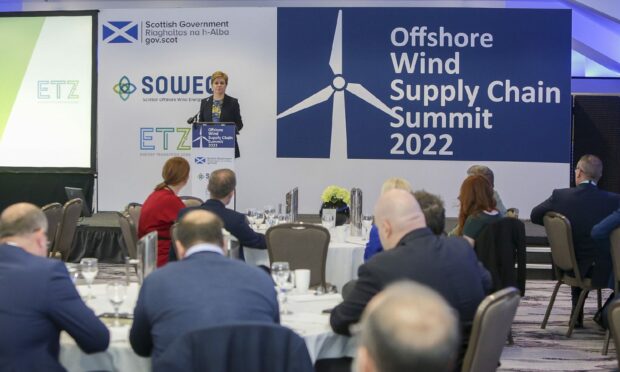Reaping the multibillion-pound rewards of ScotWind requires “rapid” investment in Scottish ports, First Minister Nicola Sturgeon has said.
At a summit with the supply chain in Aberdeen today, the First Minister underscored the “major priority” as supply chain opportunities will be linked to manufacturing and fabrication.
She said: “The infrastructure improvements we need to see won’t happen instantly. But they do need to happen rapidly.”
ScotWind is a massive seabed auction which, coupled with new projects off Shetland announced today, has potential to see 28 gigawatts (GW) of offshore wind developments off Scotland’s shores – nearly three times the existing amount of offshore wind across the entire UK.
Each GW is expected to deliver around £1bn to the Scottish supply chain, however that relies on port improvements and work in other areas like grid infrastructure.
Currently, much of Scotland’s offshore wind projects use Scottish ports as laydown areas, however the majority of the manufacturing typically takes place overseas in areas like Belgium, the UAE and China.
Major opportunity
In her ScotWind speech, Ms Sturgeon said “we hope and expect” that the UK Government’s £60m investment scheme for floating offshore wind “will benefit port facilities in Scotland”.
ETZ chair Sir Ian Wood joined the First Minister at the event. The Scottish Government’s work is meanwhile being taken forward through the public-private group the Scottish Offshore Wind Energy Council (SOWEC), which is working on a “Strategic Investment Model” to help deliver the improvements.
Ms Sturgeon said: “The Strategic Investment Model – by helping us to make investment decisions quickly – should help to enable those rapid improvements.
“So I very much hope that we will all be able to work together to develop the model at pace. It is an important way in which we can seize the full benefits of the Scotwind projects.
“Achieving those benefits won’t be straightforward. It is really important that we come at this open eyed to the challenges.”
Key ScotWind challenges
Businessman Sir Ian Wood, chair of the Energy Transition Zone (ETZ) in Aberdeen which co-hosted the event, gave an introduction at the summit, setting out key challenges ahead for capitalising on ScotWind.
He said: “It is no exaggeration to say that offshore wind, along with hydrogen development and carbon capture and storage, will have a huge impact on Scotland’s economy over the next 50 years. We absolutely must take full advantage of this opportunity.
“There’s a number of really exciting challenges: –
(1) We need to rationalise the government licensing and regulatory bodies involved including Crown Estate.
(2) We need to get National Grid and OFGEM to work together to produce the essential grid capacity where we are way short for the next 10 years.
(3) There needs to be a major effort to ensure we maximise the potential for our growing Scottish supply chain and Port capacity that stimulates sustainable economic growth for the entire country. Otherwise, significant work will go outside Scotland.
(4) We’ve got a range of consenting, environmental, military, fishing, birds, protection of local communities, and other issues to face up to.
(5) And I really hope every effort will be made to get the best possible collaboration and co-operation between Scotland and England in tackling these major joint problems.”
The aim now should be to co-ordinate between developers to enable the supply chain to “even out” its capacity, creation of fair opportunities to drive growth and “attract new inward investment where there are gaps” and optimal use of Scotland’s port infrastructure.
Serious Green Energy
Sir Ian added: “The challenge before us now is to ensure we fully realise that ambition, so Scotland becomes globally recognised for developing innovative and high value engineering, manufacturing and fabrication required to deliver at pace these exciting offshore wind projects, and those to be awarded through the INTOG process.
“The deep level of commitment in oil and gas, and the focus on collaboration post the UKCS Maximising Economic Recovery Review in 2014, is precisely what we must emulate to create a major domestic offshore wind industry that will, in time, at least partly rival the huge impact oil and gas has had on our economy and establish the UK as a serious offshore green energy participant.”
